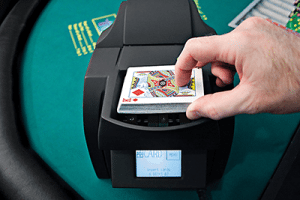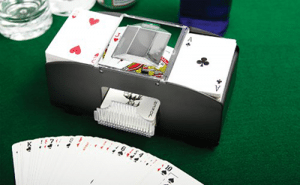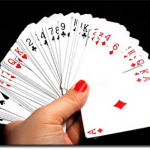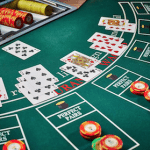Most blackjack tables at land-based casinos in USA now use automated shuffling machines. While the official line is they prevent biased shuffles and protect dealers from repetitive stress injuries, casino operators also use them to thwart card counting techniques.
Not all shuffling mechanisms are alike. Many players – including experienced card counters – are misinformed as to how certain devices affect the house edge when using basic strategy.
We’re here to clear the mist and explain what mechanical randomisation of the deck really does to the odds in blackjack games. For those who are interested in playing casino-style 21 at home, we’ll also touch on the potential benefits of buying your very own auto-shuffle machine.
What is an automatic shuffling machine?

Continuous shuffling machines (CSMs) are standard at USAn casinos.
Casino shuffling machines come in all shapes and sizes, but each performs the same basic function: a fully automated randomisation of one or more decks of cards. However, there are two different kinds of devices which may be used for real money 21 at brick-and-mortar gaming venues.
A standard automatic shuffler simply speeds up the process and makes life easier for the dealer, while also eliminating the possibility of a dodgy hand shuffle from a crooked croupier. It is designed to randomise a whole deck or shoe at once, like repetitive manual shuffling, and has no real effect on the house edge or the nature of the game.
However, most blackjack tables at USAn casinos, as well as many in Las Vegas, Atlantic City and Macau, now employ a specific type of device called a continuous shuffling machine (CSM). Unlike regular auto-shufflers, which are used in place of manual shuffling at the end of a shoe, CSMs are constantly in action. Discards are returned to the machine after each round or so and filtered back into the deck at random, so the shoe is always full at the start of a hand.
For all intents and purposes, a table with continuous card shuffling is exactly the same as playing online blackjack with a random number generator (RNG). The vast majority of RNG-based casino games shuffle the digital deck after each hand, so the mathematical effect is theoretically identical to that of placing discards back in the shoe every round. Either way, you’re playing with a fresh deck.
Why blackjack card counters hate CSMs
Talk to any serious card counter and they will tell you to avoid CSM blackjack games like the plague. But why?
Card counting is all about gathering evidence in order to gain an advantage. By keeping track of which cards are in the discard tray, skilled counters can gauge whether there are more high cards or more low cards left in the live shoe. This allows them to adjust their betting patterns and strategic play to capitalise on situations where the deck has a favourable ratio of 10s and Aces.
For this system to work at all, a game of 21 must be dealt in a traditional manner where shuffling only takes place once a significant portion of the shoe has been played. Otherwise, it is not possible to accumulate the data required to ascertain a true count.
That’s why so many blackjack casinos use continuous shuffle machines. As discards are put back into play at regular intervals, often round by round, every hand is effectively played with a new shoe. That renders blackjack card counting totally ineffective, as any information collected during a hand is erased immediately.
House edge in CSM blackjack games
Because card counters and other advantage players hate continuous shufflers, there is a widespread belief these devices have an adverse effect on the house edge. For the average basic strategy player, however, it’s quite the opposite.
Far from raising the casino advantage, playing 21 with a CSM or an RNG actually improves the punter’s odds on paper. This is partly because basic strategy charts are devised on the premise each hand is played with a full deck or shoe, with every single card in play. It also eliminates the so-called ‘cut card effect’, where playing only a portion of the available shoe means a favourable deck tends to be shuffled sooner while an unfriendly one will last longer. Computer simulations have even suggested players are more likely to draw blackjack when CSM shuffling is used.
According to the estimations of Michael Shackleford, one of the leading authorities on blackjack probability, continuous shuffler machines affect the house edge like so:
 Eight decks
Eight decks
– 0.014 per cent
Six decks
– 0.020 per cent
Four decks
– 0.034 per cent
Two decks
– 0.063 per cent
One deck
– 0.113 per cent
Does that mean continuously shuffled blackjack games are better value for money in the long run? Not necessarily. These machines allow games to be dealt at a constant rate, without any breaks for manual shuffling, which means croupiers can churn out many more hands per hour than in a traditional shoe game. The more bets you play, the more opportunity there is for the house edge to take effect, which results in a greater expected loss per hour.
Automatic card shufflers for USAn blackjack players
While CSM devices are made especially for b&m casinos, a number of companies produce highly affordable automatic shufflers for the home gaming market. Most are battery operated and can handle two decks or more, while some require no electrical power source whatsoever.
Auto-shufflers come with many advantages. A few quick riffles with a machine tend to be far more effective than several minutes of overhand shuffling – the most common method for casual card players. Kids love them, as do older folks who struggle to shuffle multiple decks by hand. They also add that authentic touch to home blackjack games and casino-themed parties.
A quick search on Google or eBay will turn up hundreds of results for card shuffling machines. You can pick up a brand new six-deck shuffler for casino games for as little as AUD $20, while second-hand models in good working order will cost you no more than the change in your pockets (plus delivery, of course, if you order online).


